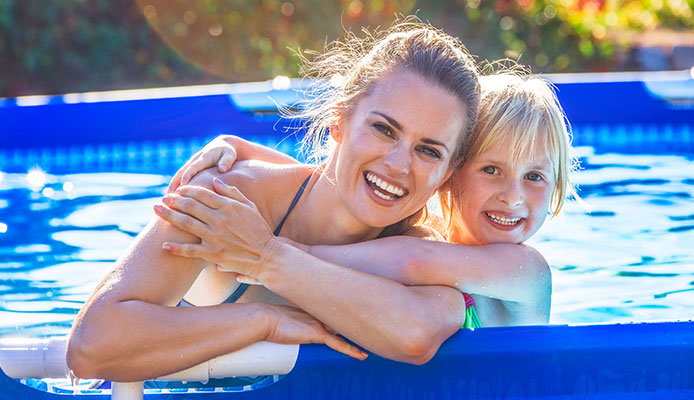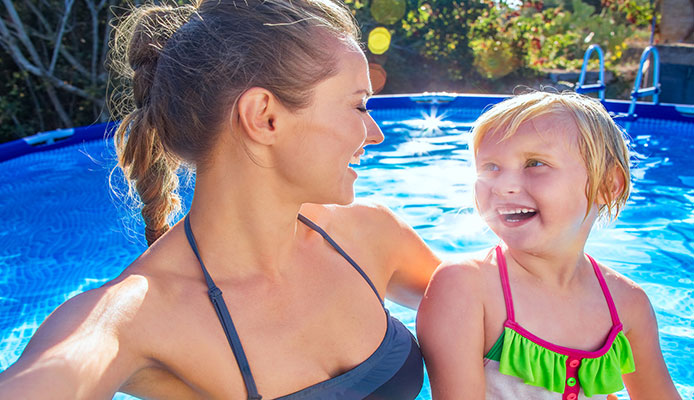
In addition to extending the pool season, heating an above ground pool can allow more pool usage at night. For pools located in areas that experience mild winters, pool heating can allow usage throughout the year.
In this article, we will focus on showing you how to heat an above ground pool. By helping you choose the best way to heat above ground pool, we hope to make your swim sessions more comfortable while helping you keep the heating costs and energy bills as low as possible.
Top Ways on How to Heat an Above Ground Pool
1. Gas Heater
Trying to figure out how to heat above ground pool fast? A gas pool heater might be your best option – it offers the fastest heating. This is understandable considering that the heater burns gas to generate the heat.
While gas heaters are affordable to purchase, their downside is that they feature high monthly operating costs. The main reason for the high operating cost is the heat source, which is gas. This is why most of the gas heaters are used to heat spas or as backups for smaller above ground pools.
For pool owners whose top priority is high heating speed, and they do not mind spending money on the gas, the gas heater may be the best option.
2. Pool Heat Pump
Pool heat pumps make achieving a good balance between cost-effectiveness and speed possible. Although pool heat pumps warm up the pool water slower than the gas heaters, the pumps make up for it with their eco-friendly performance and superior energy efficiency. Most heat pumps are over 60% cheaper than gas heaters.
It is important to note that this above ground pool heater is temperature-dependent. While the heat pump can generate a lot of heat with or without the sun, they are generally less effective once the temperature outside drops to below 50 degrees.
3. Solar Heater
When relying on only the sun to heat your pool, you may have to swim in cold water. However, when you rely on solar energy, this will not be the case. The best way to heat ground pools during the summer season, solar heaters are both cost-effective and eco-friendly.
As the name suggests, solar heaters entirely depend on the sun to produce heat. They work by absorbing solar energy via a solar panel array, which connects to your above ground pool. With the help of the pool pump, water moves through this solar array, warming up before re-entering the pool.
Solar heaters only require electricity for the pool pump. For this reason, they have the cheapest monthly operating cost. On the flip side, solar heaters feature the highest installation cost. This is because the process needs multiple steps, from the panel installation to set up the plumbing.
The biggest limitation of using solar heaters is their dependency on sunlight. Without several hours of consistent sunlight, your solar pool heater won’t be able to work effectively. This means that when you have to swim on a cloudy day, you should expect the water to be chilly.
4. Solar Covers
While solar covers can warm up a pool, you should think of them as hearing aids. When thinking of how to heat an above ground pool, you shouldn’t consider them as the priority. This is because they simply don’t offer the level of performance and heat you get from an above ground pool heater. Below, we will look at the different types of solar pool covers:
Solar Blankets
Pools lose up to 75% of their heat via evaporation. Slowing down the evaporation can help keep the water warmer. 2 types of blankets can help you stop the evaporation – solid and floating blankets.
Solid Pool Blankets
These are heavy and usually require a mechanical device to roll & unroll them when you are covering your pool. They reduce the evaporation to near zero and they can hold the weight of small children and pets who wander in the pool – this increases water safety.
Floating Pool Blankets
These do not support any weight and they do not prevent children and pets from entering the pool. However, they are more affordable and can be rolled and unrolled by hand. Their evaporation reduction is less effective compared to solid blankets.
Solar Rings
Solar rings are smaller, more manageable pool covers. They are large discs that float on top of the pool to reduce heat loss via evaporation. Unlike solar blankets, they can be handled by a single individual. You simply have to toss them in the pool. Purchasing rings featuring magnets can help reduce spaces between them.
You might also like: Build Above Ground Pool From Scratch
Liquid Solar Blankets
These are nontoxic liquids added to the above ground pool to create a chemical barrier that slows evaporation and keeps the water warm. While the liquid covers are not as effective as blankets or rings, they are environmentally friendly, safe for the pool equipment, and are invisible to the eye.
5. Wood Burning Pool Heater
It is not uncommon for pool owners to want to know how to heat an above ground pool using wood. For these owners, investing in a wood-burning heater may be a good idea. While most of the wood pool heaters are custom built or DIY, a few manufacturers offer some great above ground pool heaters that use wood only.
Wood pool heaters work exactly how you would think. They burn wood and then transfer the heat generated to your water with the help of a pump.
Before deciding to go with the wood pool heaters, you need to consider how much wood you will burn and how often you will need to keep the heater running for your water to be adequately warm. The answer to these questions will be largely dependent on the time of the year and the pool size.
In terms of cost-effectiveness, wood-burning heaters are behind solar heaters and heat pumps. However, when the goal is to know how to heat above a small ground pool or a spa, the wood heaters may be ideal.
6. Wind Shielding
Wind shielding does not necessarily heat your pool. Similar to pool covers, it reduces the rate of heat loss. By shielding your pool from wind, you will help slow evaporation and heat loss.
Evaporation rates usually increase as the water surface area increases. Wind creates waves and ripples on the pool surface – these increase the water surface area, accelerating the rate at which your pool water loses heat via evaporation.
Confused about how to heat an above ground pool via wind shielding? Simply add an enclosure around the pool. A pool fence featuring the ability to block the wind should help you reduce heat loss.
The cost of this method will be largely dependent on the pool size, the height of your enclosure, and the materials you use to build it. Once you install the enclosure, however, you will need to perform very minimal maintenance. As an added benefit, enclosures covering the pool entirely, allow you to swim in the rain too.
FAQs

Q: Can You Put A Heater on An Above Ground Pool?
Yes, you can use a pool heater to heat your above ground pool. You can use a gas heater, solar heater, or a wood pool heater. To choose the best above ground pool heater, you should consider their cost-effectiveness and heating efficiency – we have discussed both in this article.
Q: What Is the Best Heater for An Above Ground Pool?
For pool owners concerned with heating speed, the gas heater should be the best option since it has the highest heating speed. When the cost is a major concern, the pool heat pump may be a better option – the pool heat pump is over 60% cheaper than the gas heater.
Q: How Much Does It Cost to Heat an Above Ground Pool?
The cost of heating a pool pump is largely dependent on the pool size, the heating method you choose and the set temperature. For example, when you decide to use a gas heater to heat a 1000 square foot pool for 1 year, you should expect to spend $1,448 to heat your pool to 78 degrees, $1,904 to heat the pool to 80 degrees, and $2,384 for 82 degrees.
When you use a heat pump, the annual cost reduces to $740 for 78 degrees, $975 for 80 degrees, and $1,220 for 82 degrees.
Q: Can You Heat an Intex Pool?
Yes, you can heat your Intex pool. Similar to other above ground pools, your heating options range from a gas heater, pool heat pump, solar covers, solar heaters, and wood pool heaters.
Q: How Long Does an Above Ground Pool Take to Warm Up?
The answer to this question depends on the type of heater you are using. Assuming that you are using a heat pump, you will need to wait between 24 and 72 hours to heat your pool by 11 degrees centigrade (20 degrees Fahrenheit).
Globo Surf Overview
Swimming in chilly water is not always enjoyable. This is why you need to think of how to heat an above ground pool. In this article, we have included the top methods you can use to heat your pool. To choose the best above ground pool heater, you will need to consider both the cost and how effective the heating mechanism will be.
More Above Ground Pool Guides:
- Pool Deck Cleaning: How To Clean Pool Deck
- Above Ground Pool Removal: How To Take Down Above Ground Pool
- 8 Solutions On How To Level An Above Ground Pool
- How To Setup Intex Pool In Less Than 1h
- Intex Pool Cleaning Guide: Intex Pool Chemicals Startup
- How To Drain An Above Ground Pool Very Fast
- DIY Above Ground Pool: Build Above Ground Pool From Scratch
- 5 Easy Steps To Open An Above Ground Pool
- What To Put under Above Ground Pool On Grass?
- Swimming in The Rain: Is It Safe to Swim in The Rain?
- 8 Ways To Maintain And Clean Your Above Ground Pool
- What Is A Spool Pool?

